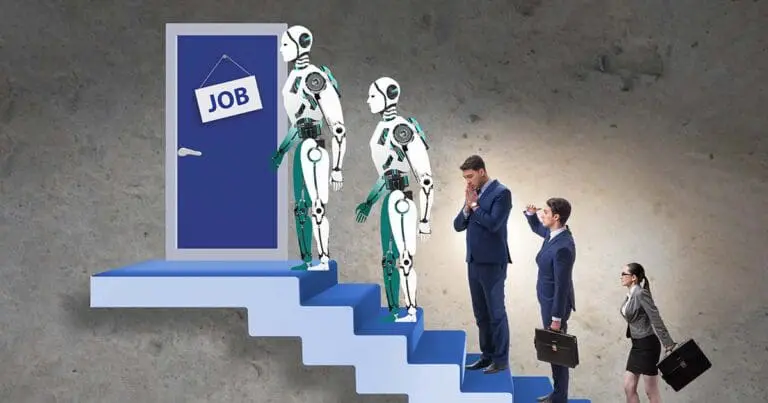Addressing FOBO (Fear of Being Obsolete) in the Age of AI

In the near-future world of 2024, where the global labor movement is becoming both a force to be reckoned with and a burning concern for workers worldwide, there’s a phenomenon that has gripped the hearts and minds of employees everywhere — the insidious and pervasive Fear of Being Obsolete, also known as FOBO.
As the rapid advancements in technology and the rise of artificial intelligence reshape the foundations of industries, workers find themselves standing at the precipice of an uncertain future.
As we delve into the tumultuous world of labor movements in the year 2024, we see that workers’ fears are not unfounded.
To dispel some of these fears and determine the best path forward, we can begin by unraveling AI’s pivotal role in fueling these anxieties and exploring the intersection of technology and job insecurity.
What is FOBO (Fear of Being Obsolete)?
FOBO, or Fear of Being Obsolete, refers to the anxiety experienced by workers who fear that their skills or roles may become irrelevant due to technological advancements, particularly the rise of artificial intelligence.
These fear levels stem from the accelerating rate of technological change and the perception that machines could replace human labor.
This pervasive concern about technology making things more difficult in the modern workforce highlights the need for continuous learning and adaptability in the face of rapid technological progress.
The modern employment landscape
The modern employment landscape driving FOBO consists of technological advancements, outdated employment models, impact of AI on traditional job roles, and worker satisfaction in the face of FOBO.
Technological advancements causing FOBO
Technological advancements are significantly reshaping the job market, ushering in an era of disruption and transformation.
As automation and AI technologies become more sophisticated, they are capable of performing tasks previously carried out by humans, thereby altering the demand for certain skills and job roles.
However, while this shift can render some jobs obsolete, it also creates new opportunities for roles focused on managing, developing, and utilizing these technologies.
Outdated employment models causing FOBO
Traditional employment models, characterized by fixed roles and linear career paths, are becoming increasingly outdated in the face of rapid technological change.
These models often fail to accommodate the fluidity and adaptability required in a technology-driven job market, hampering employees’ abilities to reskill, adapt, and stay relevant.
Instead, a shift towards more flexible models, which prioritize continuous learning, skill diversification, and adaptability, is needed to address the challenges of the modern workforce.
Impact of AI on traditional job roles
AI and automation have significantly impacted traditional job roles, particularly those involving routine, repetitive tasks.
These technologies have the potential to automate large swathes of such tasks, leading to a shift in the nature of jobs and potentially rendering some roles redundant.
However, this same technological disruption also paves the way for the creation of new job roles centered around the development, management, and ethical use of AI and automation.
Worker satisfaction in the face of FOBO
The rapid evolution of technology, while promising unprecedented efficiency and advancements, may inadvertently create a disconnect with worker satisfaction.
Employees may feel threatened or undervalued as they perceive their skills being outstripped by AI and automation.
Therefore, organizations must invest in efforts addressing these concerns, fostering an environment where technology aids rather than replaces human language and labor.
Employer strategies to address FOBO
Employer strategies to address FOBO can include employer acknowledgement of FOBO, prioritizing upskilling, building an agile business culture, emphasizing mental well-being, and leveraging staffing agencies.
Employer acknowledgement of FOBO
The necessity for employers to address workers’ FOBO is paramount in maintaining a harmonious and productive work environment.
By acknowledging and addressing these fears, employers can foster a culture of continuous learning and adaptability, which is crucial in the technology-driven future.
Effective strategies may include providing opportunities for upskilling and reskilling, promoting a culture of lifelong learning, and illustrating the complementarity of human skills and AI capabilities.
Prioritizing upskilling
Upskilling is a critical strategy for employers to help their workers combat FOBO, as it equips them with the necessary skills to adapt to the evolving technological landscape.
By providing ample training and learning opportunities, employers can ensure their employees are prepared to leverage emerging technologies, preventing obsolescence and enhancing their job security.
Consequently, a well-executed upskilling initiative mitigates FOBO and fosters an adaptable, resilient, and future-ready workforce.
Building an agile business culture
Encouraging a continuous learning and adaptability culture is a cornerstone of creating an agile business environment in the face of FOBO.
This approach empowers employees to stay relevant and competitive as they navigate the dynamic technological landscape.
By nurturing such a culture, companies not only alleviate employees’ fear of obsolescence but also foster innovation and progress, driving the organization’s success in the age of AI.
Emphasize mental well-being
Emphasizing mental well-being in the workplace is imperative as it directly impacts employees’ productivity, creativity, and overall job satisfaction.
Encouraging self-care practices, providing mental health resources, and fostering a supportive work environment can significantly alleviate FOBO and promote a healthier, more resilient workforce.
Additionally, creating an environment that encourages innovative thinking allows employees to see technology as a tool for advancement rather than a threat, thereby driving forward progress and maintaining relevance in the era of AI.
Leverage staffing agencies
Leveraging staffing agencies can be an effective strategy in finding talent with the desired skill sets essential to thrive in the era of AI and automation.
These agencies, with their extensive networks and deep understanding of the job market, can identify and recruit individuals who are adaptable and equipped with the necessary technical and soft skills.
Moreover, they can also provide valuable insights into workforce trends and technological advancements, helping businesses stay competitive and relevant.
Strategies to safeguard job security and avoid FOBO
Strategies to safeguard job security and avoid FOBO include, individual skill development, developing non-automated skills, the importance of soft skills, and cultivating interdisciplinary knowledge.
Individual skill development
In the face of FOBO, individuals can also leverage staffing agencies for their professional development and career advancement.
These agencies offer career counseling and training programs, enabling individuals to acquire the desired skill sets and stay abreast of the latest technological trends.
Furthermore, by connecting candidates with potential employers, staffing agencies play a key role in facilitating a seamless transition in the evolving job market.
Developing non-automated skills
Developing skills that are less likely to be automated is a proactive approach to ensuring job security.
Critical thinking, creativity, emotional intelligence, and leadership are examples of such skills.
These skills, which are innately human and hard to replicate by machines, will continue to be in high demand, even in the age of AI and automation.
Importance of soft skills
In the era of rapid technological advancements, soft skills hold significance as they complement technical skills and are less prone to automation.
These include communication, problem-solving, leadership, and emotional intelligence.
Cultivating these skills can enhance an individual’s ability to adapt to changes, foster collaboration, and ensure career longevity in the age of AI and automation.
Cultivating interdisciplinary knowledge
Cultivating interdisciplinary knowledge is a potent strategy to safeguard relevance in the rapidly changing work environment.
For instance, a marketer with a strong understanding of data analytics can leverage insights to shape more effective campaigns.
Similarly, a software developer equipped with knowledge in user experience design is well positioned to create more intuitive and user-friendly applications.
These examples illuminate how understanding multiple fields enables individuals to bring a multifaceted approach to problem-solving, thus fostering innovation and adaptability.
Taking advantage of emerging AI job roles
Embracing the emerging AI job roles is an effective strategy to mitigate FOBO.
These new roles, such as AI specialists, data analysts, and machine learning engineers, represent the evolving landscape of the job market.
By acquiring relevant skills and pursuing these roles, individuals can stay at the forefront of technological advancement, ensuring career longevity and relevance.
FOBO in the Modern Employment Landscape
In this rapidly evolving technological landscape, it is incumbent upon employers to adapt and equip their workforce with the necessary skills to thrive amidst change.
The future of work will be shaped collaboratively, with both employers and employees playing integral roles in fostering a culture of continuous learning, adaptability, and resilience.
Embracing change and preparing for the future is not optional – it is a strategic imperative for businesses aiming to stay competitive and relevant.
Employers are thus encouraged to leverage the expertise of staffing professionals to effectively navigate these changes, ensuring the organization and its employees are future-ready.
Looking to hire top-tier Tech, Digital Marketing, or Creative Talent? We can help.
Every year, Mondo helps to fill over 2,000 open positions nationwide.
More articles about hiring and industry trends:
- Specialized AI Bots and the Evolution Beyond ChatGPT
- 24 Top In-Demand Tech and IT Jobs to Hire in 2024, with Salaries
- Fractional Executives & C-Suite Gig Work Shaping the Employment Landscape
- Harnessing the Power of Climate Tech to Drive Environmental Sustainability
- Staffing Strategies For Each Phase of the Business Cycle
- How to Leverage Tech and Digital Marketing for Back-of-House Hospitality
- Key Roles to Get the Most Out of Your MarTech Stack
- Tapping the Gig Economy: When It Makes Sense to Hire Contractors
- How Executive Recruiters Ease Your Hiring Process
- What to Do When You Have Urgent Hiring Needs
- Generative AI & Its Impact on the Job Market: It’s Not All Bad News
- How to Recruit Top Data Scientists in a Competitive Job Market
- Lessons From Unicorn Companies: Hiring Strategies for Rapid Growth



